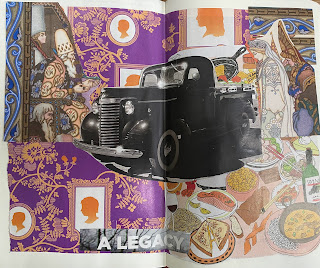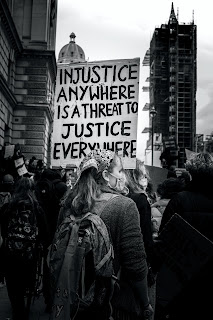Day 14 - Using the word “healing”
 |
| Photo by Greg Rosenke on Unsplash |
Today I’ve been struggling with the idea that the healing power of art is universal. I guess it’s the notion of universal that has me stuck! I do believe that engaging with one’s creativity can be “healing.” So maybe it’s the word “healing” that I’m stuck on.
What about this word “healing?” Apple dictionary defines healing as “the process of making or becoming sound or healthy again.” Despite that straightforward definition, “therapy” has traditionally been associated with the medical model and “cure.” As a result, there is controversy about, and a continuum of positions arts therapists take on, the word “healing.”
Some people are eager to embrace the notion of healing as part of our work. Some people associate the word healing with spirituality and/or religion. While others feel the term healing should be reserved for indigenous healing traditions and/or culturally informed healing practices. Some take a more “complementary and alternative medicine” approach to this word, and associate “healing” with “arts and health” – a growing movement within the US (see the recent “white” paper published by the National Association of Arts in Health - NOAH, entitled, Arts, health, and well-being in America, 2017).
French, et al., (2017) also remind us of concerns about the practice of psychotherapy and mental healthcare in communities of color. These practices may sometimes be done best outside of traditional mental health systems or in collaboration with “respected Indigenous and spiritual healers” and community organizers.
It is also important for clinicians to be aware of the cultural mistrust that exists in POCI [People of Color and Indigenous individuals] communities given the medical abuses perpetuated against marginalized individuals in U.S. history (Terrell, Taylor, Menzie, & Barrett, 2009). Thus, community-based healing and religious and/ or spiritual leaders are often more trusted than traditional mental health providers, more widely accessible, and generally have leadership roles in communities of POCI. From this perspective, mental health providers are encouraged to collaborate with respected Indigenous and spiritual healers to provide alternative therapeutic spaces. (p. 30)
This mistrust exists not only in BIPOC (Black, Indigenous, People of Color) communities but also in other marginalized communities. Are you familiar with this mistrust? Is there trust in the mental health system in the communities to which you belong? What would a collaboration with respected “healers” or an alternative therapeutic space look like in your community?
French, B. H., Lewis, J. A., Mosley, D. V., Adames, H. Y., Chavez-Dueñas, N. Y., Chen, G. A., & Neville, H. A. (2020). Toward a psychological framework of radical healing in communities of color. The Counseling Psychologist, 48(1), 14-46. https://doi.org/10.1177/0011000019843506



Comments